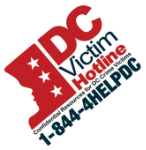Featured Community Partner: NVRDC
Blog posts featuring our community partners are designed to highlight the services of local organizations in the District of Columbia. Our goal is to increase the visibility of supportive services in order to help make the recovery process faster and easier for victims of crime. Our first featured partner is NVRDC.
The Network for Victim Recovery of DC (NVRDC) was founded on the principle that all survivors of crime, regardless of the type of crime, need a place where they can process their experiences, understand their rights, and access support and resources. NVRDC is designed with an innovative co-leadership model, which increases transparency, accountability, communication, and perspective. NVRDC provides case management and criminal legal services to victims and survivors of all types of crime, and civil legal services to survivors of intimate partner violence, sexual assault, and stalking.
Case Management: help and support after a crime
Who is eligible for case management services?
- Any survivor of a crime that occurred in Washington, DC
- Any person who is 18 years of age or older (some exceptions apply)
What does case management include?
- An advocate to go with you to a sexual assault forensic exam
- Transportation to and from forensic exams using Uber
- Crisis intervention, coping skills and emotional support
- Explaining different ways to report the crime
- Assistance with the Crime Victims Compensation Application
- An advocate to go with you to court or on campus proceedings
- Letters of support to your school or workplace
- Referrals to other services as needed
Civil Legal Services: help staying safe
Who is eligible for civil legal services?
Survivors of a crime that occurred in Washington, DC OR who live in Washington, DC, AND who are 18 years of age or older (some exceptions apply), AND the case relates to being a victim of intimate partner violence, stalking and/or sexual assault
How can NVRDC help?
- Explaining and filing for a Temporary Protection Order (TPO) or Civil Protection Order (CPO)
- TPO & CPO: Provide advice, information and/or representation regarding:
- The Temporary Protection Order hearing
- The Civil Protection Order hearing
- Modifying, extending or vacating a Civil Protection Order or reinstating a Civil Protection order case
- Violations of a Civil Protection Order
- Title IX: Providing advice, information, and/or representation regarding:
- Reporting intimate partner violence, sexual assault or stalking to university/college campus police/public safety (regardless of assailant’s affiliation or lack thereof with the academic institution)
- Reporting intimate partner violence, sexual assault, or stalking to university/college Title IX office
- Filing conduct complaint against a student assailant (regardless of victim’s affiliation or lack thereof with the academic institution)
- Going to hearings, interviews related to conduct complaint
- Speaking with a university/college on behalf of student-client
- Requesting accommodations under Title IX such as dorm changes, class and exam schedule changes, no contact orders
Criminal Legal Services: help protecting your rights as a victim of crime
Who is eligible for criminal legal services?
Survivors of a crime that occurred in Washington, DC OR who live in Washington, DC AND who are seeking information, advice and/or representation related to the crime. Persons 12 years of age or older are eligible with stated interest of the client; if under 12, NVRDC might be able to provide representation through a parent/guardian.
What are some of the things that can be provided through criminal legal services?
- Help reporting a crime
- Accompaniment and advisement for survivors at pre-grand jury meetings with the prosecutor and before and after grand jury testimony
- During the prosecution of the case, NVRDC can help by:
- Entering into criminal case as crime victim’s attorney victim’s rights are respected under the Crime Victim’s Rights act. Read more about your rights.
- Speaking with the prosecutor and going to court hearings on behalf of the client
- Going with the client to court and pre-trial meetings with prosecutor
- Representing the client in making sure their rights are respected
- Entering into criminal case as crime victim’s attorney victim’s rights are respected under the Crime Victim’s Rights act. Read more about your rights.
What are some other areas that NVRDC lawyers can help with?
- Creating safety plans
- Providing referrals regarding family law matters, civil tort claims, other legal issues
- Writing cease & desist letters
- Can sometimes provide limited information regarding Temporary Restraining Orders
What are the things that NVRDC CANNOT provide?
- They do not represent criminal defendants.
- They cannot assist with quashing witness subpoenas in criminal prosecutions.
- They cannot provide representation of clients in matters occurring outside the District of Columbia (some exceptions apply).
- They cannot provide representation in Temporary Restraining Order matters (this is different than a Temporary ProtectionOrder).
- They are not able to file civil lawsuits against another party.
- They cannot represent campus survivors regarding sexual assault harassment only (but can provide representation in criminal matters)
What is the best way to contact NVRDC?
Always set up an appointment first, either by phone or by email. Though NVRDC strives to serve as many victims as possible, there is no guarantee of representation or services.
Phone: 202-742-1727
Email: [email protected]
Website: www.nvrdc.org
Address: 5321 First Place, NE, Washington, DC 20011

